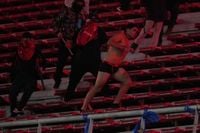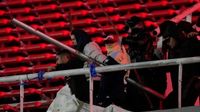The Libertadores de América Stadium in Buenos Aires was the scene of shocking chaos on August 20, 2025, as a Copa Sudamericana last-16 second-leg clash between Argentina’s Independiente and Chile’s Universidad de Chile descended into one of the most violent episodes in recent South American football history. The match, which had started with high anticipation and a 1-0 aggregate lead for the visiting Chilean side, was abandoned after just 48 minutes as violence erupted between rival fans, leaving dozens injured, hundreds detained, and the future of both clubs in the tournament hanging in the balance.
It all began in the upper stands, where approximately 4,000 Universidad de Chile supporters were situated. According to official reports from the Buenos Aires Security Ministry and Argentine police, the trouble started when some Chilean fans smashed bathrooms, food outlets, and stadium seats. Soon after, they began hurling bottles, stones, sticks, and even seats down toward the section housing Independiente’s home supporters. Despite repeated warnings from police over the stadium loudspeakers, the projectiles kept flying.
The situation spiraled out of control when dozens of Independiente fans, some reportedly hooded and wielding sticks and metal bars, broke down doors and stormed the visitors’ section. With police and private security notably absent in that area, the scene quickly became a battleground. Witnesses and video footage captured the desperate moments as two Chilean fans, cornered and fearing for their lives, leaped from the upper deck to escape the onslaught. Miraculously, one man survived the fall thanks to a roof below that cushioned his landing, according to Chilean officials. Others were not so lucky—fans were left bloodied, stripped, and begging for mercy, with at least two requiring emergency surgery for severe head and neck injuries.
Ignacio Castro, a 38-year-old Chilean psychologist, recounted his ordeal: "They beat me with clubs and iron bars in the stands, they stole everything from me." He added, "When I went down to seek help from the police, they took me to the hospital, stitched me up, and then arrested me." Castro was just one of many who found themselves both victims of violence and, astonishingly, targets of law enforcement action in the aftermath.
In total, over 100 people were arrested—Argentine media cited more than 300 Universidad de Chile fans detained, while official sources confirmed 125 arrests, with 104 Chileans later released. The confusion over the exact numbers only underscored the chaos of the night. Fans who lost their documents during the melee were issued temporary travel papers to return home, Chilean diplomatic sources confirmed. The injured toll varied as well: Independiente’s spokesperson initially reported 10 injuries, but authorities and international agencies put the figure at around 20, with two in critical condition. Dpa reported the number of injured could be as high as 200.
The violence did not go unnoticed by the highest authorities in football. FIFA President Gianni Infantino issued a stern condemnation: "I strongly condemn the shocking violence which led to the cancellation of the Copa Sudamericana match between Independiente and Universidad de Chile. Violence has no place in soccer—players, fans, staff, officials and everyone who enjoys our beautiful game should be able to do so without fear." He called for "exemplary sanctions against the perpetrators of terrible acts," echoing the growing international demand for accountability.
CONMEBOL, South America’s governing body for football, announced that its Disciplinary Unit was collecting data and would soon issue a ruling. "The Confederation is collecting data and processing information, which is being forwarded to the Disciplinary Unit for the application of the corresponding sanctions," CONMEBOL said in a statement. The organization has a precedent for severe punishment: earlier this year, after a Copa Libertadores match between Colo Colo and Fortaleza was canceled following deadly clashes, the Chilean side was handed a defeat and forced to play five home matches behind closed doors. It’s possible, insiders say, that both Independiente and Universidad de Chile could face disqualification from international competitions next year.
The fallout extended beyond the pitch. Buenos Aires Security Minister Javier Alonso revealed that "some 20 legal cases" were likely to follow, criticizing the absence of the private security company that was supposed to be present. "There are people who have to be held accountable because there was a security company that was supposed to be there and wasn’t," Alonso remarked. The stadium itself was closed by court order pending forensic investigation, with bullet casings, rocks, torn-out seats, and bloodstains littering the stands where the violence had erupted.
Chilean President Gabriel Boric weighed in, signaling his government’s intent to pursue legal action. "I think it is reasonable to file a complaint against those responsible for this kind of aggression," he stated, while Chile’s Interior Minister Alvaro Elizalde decried the "barbarity" and "lynching" that had occurred. The diplomatic tensions between the two nations were palpable, with Universidad de Chile’s president Michael Clark stating, "They’re not up to the task; there’s a dehumanization of what happened. When they went to Santiago (for the first leg), nothing happened to them."
Independiente’s president, Néstor Grindetti, traveled to CONMEBOL headquarters in Paraguay to defend his club, insisting, "It’s clear from the images that the Chileans committed the vandalism from the start of the match." The blame game only further complicated an already tangled web of responsibility and retribution.
South American football has long struggled with fan violence, and the events in Avellaneda are just the latest in a tragic series. In April 2025, two fans died in Santiago ahead of a Copa Libertadores match between Colo Colo and Fortaleza. Between 2009 and 2019 in Brazil, 157 people lost their lives to football-related violence; Colombia reported 170 deaths between 2001 and 2019. The pattern is grim, and the calls for reform are growing louder with each new incident.
As it stands, the fate of Independiente and Universidad de Chile in the Copa Sudamericana is in the hands of CONMEBOL’s disciplinary committee. Peru’s Alianza Lima, set to face the winner in the quarterfinals, now waits in limbo. The stadium remains shuttered, and legal proceedings are only just beginning. This latest eruption of violence has once again cast a dark shadow over South American football, raising urgent questions about security, accountability, and the future of the beautiful game on the continent.
For now, the Libertadores de América is silent, its stands stained by the memory of a night when football’s passion turned to mayhem. The world watches and waits to see what justice, if any, will come from this latest tragedy.



